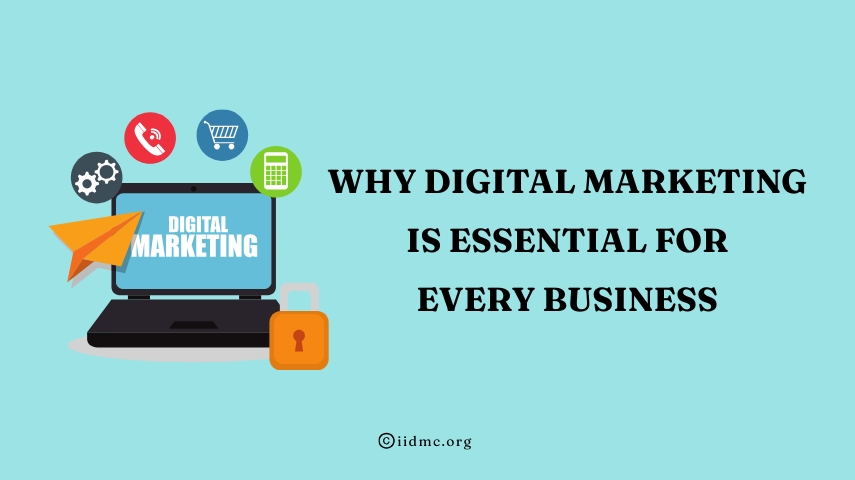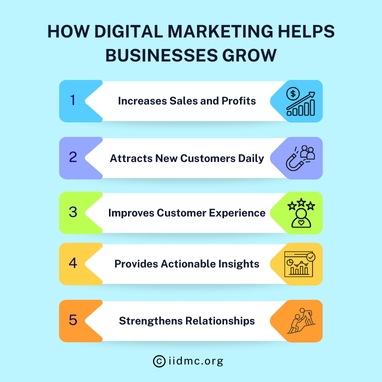
Digital marketing is now important for every business, no matter how big or small. Today, most people spend a lot of time online—looking for information, shopping, or staying connected with others. This means your future customers are already online, and if your business cannot be found there, you may lose them to other companies that are active digitally. Unlike old-style marketing methods, digital marketing makes it possible to reach the right people at the right time with the right message, which makes it one of the strongest tools to grow a business.
Another big reason digital marketing is so important is that it saves money and gives clear results. With options like social media, search engines, and email, even small businesses can stand out and compete with bigger brands by focusing on the people who matter most to them. Digital marketing also gives useful information about what customers like and how they behave, so businesses can improve their plans and decisions. In short, digital marketing not only helps businesses get more attention but also creates stronger connections with customers in ways that traditional marketing cannot.
What Is Digital Marketing?
Digital marketing refers to all marketing efforts that use the internet or digital channels to reach customers. Unlike traditional marketing, it allows businesses to reach audiences in real-time and track results more effectively.
Key elements include:
Websites and Blogs: Your digital storefront and information hub.
Search Engines: Ensuring your business appears when people search for products or services you offer.
Social Media: Engaging with audiences on platforms like Facebook, Instagram, LinkedIn, or TikTok.
Email Marketing: Sending tailored messages and offers to customers directly.
Online Advertising: Running ads on Google or social media platforms to capture immediate attention.
Digital marketing combines all these channels to create a consistent brand presence and connect with customers at different stages of their journey.
Why Digital Marketing Is Important for Businesses
Digital marketing has become a core driver of business growth. Its importance lies in its ability to offer results that traditional marketing cannot.
Global Reach: Businesses can expand beyond their local market and connect with customers across countries and continents.
Cost-Effectiveness: Compared to expensive TV commercials or print ads, digital marketing campaigns are affordable and deliver higher returns.
Measurable Results: With tools like Google Analytics or social media insights, businesses can track customer behavior, campaign success, and sales in real time.
24/7 Visibility: A well-optimized website or social media page keeps your business visible around the clock, even when you are not actively promoting.
Builds Credibility: Customers today research online before making a decision. Having a strong online presence builds trust and positions you as a credible brand.
Benefits for Small and Large Businesses
Digital marketing is equally valuable for both startups and established enterprises.
For small businesses and startups:
Offers opportunities to compete with larger players.
Helps target only the right audience, rather than wasting money on broad advertising.
Provides faster results and growth potential with a smaller budget.
For large businesses:
Strengthens brand awareness and customer loyalty.
Helps in maintaining a consistent connection with existing customers.
Expands reach to new segments and untapped markets.
Types of Digital Marketing
There are different methods of digital marketing, each serving a unique purpose:
SEO (Search Engine Optimization): Optimizing websites and content so they appear higher in search results. For example, when someone searches for "best digital marketing services," your business should show up on the first page.
Social Media Marketing: Building brand awareness and engagement through platforms like Facebook, Instagram, LinkedIn, or Twitter. Example: running Instagram ads for a clothing store.
Content Marketing: Sharing valuable information through blogs, videos, and infographics to educate and attract customers. For instance, a healthcare brand posting blogs about wellness tips.
Email Marketing: Sending personalized updates, discounts, or educational newsletters to keep customers engaged. Example: an e-commerce store sending weekly offers.
PPC (Pay-Per-Click) Advertising: Paid campaigns where businesses pay only when someone clicks their ad. For example, Google Ads that show up when people search for “plumbing services near me.”
Influencer Marketing: Partnering with social media influencers to promote your brand. For example, a skincare brand collaborating with a beauty blogger.
How Digital Marketing Helps Businesses Grow
The ultimate goal of digital marketing is growth — in terms of brand awareness, customer acquisition, and revenue.

Increases Sales and Profits: By reaching the right customers with the right message, businesses generate more leads and convert them into sales.
Attracts New Customers Daily: With search engines and social media, businesses can gain new customers every day without geographical limits.
Improves Customer Experience: Features like chatbots and instant messaging provide quick support and build positive experiences.
Provides Actionable Insights: Analytics tools give businesses clear data on customer behavior and preferences. This feedback helps refine products, services, and campaigns.
Strengthens Relationships: Regular updates, personalized messages, and quality content keep customers engaged long after their first purchase.
Challenges in Digital Marketing
Like every business strategy, digital marketing has its challenges. However, these can be addressed with the right approach:
High Competition: Many businesses are fighting for attention online. The solution is to create unique content and focus on specific niches rather than trying to reach everyone.
Ad Fatigue: Customers often ignore repetitive ads. The solution is to use engaging formats such as videos, reels, and interactive posts.
Changing Technology and Algorithms: Platforms frequently update their systems. Businesses must stay updated and adapt strategies accordingly.
Building Trust: Gaining customer trust online can be difficult. The solution is to use social proof, share testimonials, provide consistent service, and be transparent in communication.
The Future of Digital Marketing
The digital world is evolving rapidly, and businesses must be prepared for future trends:
Artificial Intelligence and Automation: Smarter tools will handle targeting, ad placements, and customer support.
Video Marketing: Short-form videos, live streaming, and interactive content will dominate.
Voice Search: As more people use smart speakers and voice assistants, optimizing content for voice queries will be crucial.
Virtual and Augmented Reality: Businesses will create immersive shopping and service experiences in virtual environments like the Metaverse.
How to Become a Digital Marketing Expert
Becoming a digital marketing expert takes learning, practice, and consistency. Here are five simple steps:
Learn the Basics: Understand SEO, social media, content marketing, email marketing, and paid ads.
Get Certified: Take online courses to build skills and earn certifications. Some popular institutes like IIDMC offer the best Certified Digital Marketing Expert Programs.
Practice on Real Projects: Create a blog, website, or social media page to test your skills. Run small ad campaigns and learn from the results.
Keep Up With Trends: Stay updated with new tools, platforms, and strategies. Learn about AI, voice search, and automation through blogs, podcasts, and industry experts.
Build a Portfolio and Network: Showcase your results in a portfolio and connect with other marketers on LinkedIn, webinars, and events. This helps in finding jobs, freelance work, or clients.
Best Institute Offering the Best Digital Marketing Certification
In today’s fast-growing online world, having strong digital marketing skills is essential for every professional and business owner. While there are many courses and institutes available, choosing the right one can make a big difference in your career.
One of the best institutes for digital marketing certification is the International Institute of Digital Marketing Certifications (IIDMC).
Why Choose IIDMC?
Global Recognition: IIDMC is known internationally, which means your certification is respected and valued worldwide.
Comprehensive Curriculum: The courses cover all important areas of digital marketing — SEO, social media, email marketing, content marketing, paid ads, and analytics.
Practical Learning: IIDMC focuses not just on theory but also on real-world projects, case studies, and hands-on assignments.
Industry Experts as Trainers: Programs are designed and taught by professionals who have years of experience in digital marketing.
Career Opportunities: With an IIDMC certificate, you can apply for jobs globally, start freelancing, or grow your own business with confidence.
Digital marketing is essential for every business because it helps connect with customers where they spend most of their time online. It allows businesses to reach a wider audience, promote products and services at a lower cost, and track results in real time. Whether it is through social media, search engines, email, or online ads, digital marketing builds brand awareness, trust, and customer relationships. In today’s competitive world, having a strong digital presence is no longer optional but necessary for growth and long-term success.
